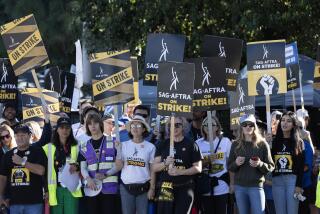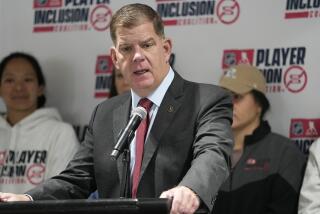NHL follows the NBA only so far in its labor negotiations
- Share via
The NBA season was slipping away as Thanksgiving 2011 approached.
The league and the National Basketball Players Assn. were so far apart in labor negotiations that players took the drastic step of dissolving their union by filing a disclaimer of interest, allowing them to initiate class-action antitrust lawsuits against the league. Based on Commissioner David Stern’s insistence that the NBA would need 30 days from the time a handshake deal was reached until the season could start, prospects were bleak for preserving the showcase Christmas Day schedule.
After more than a week without talks, negotiators met on the Tuesday before Thanksgiving. By the early hours of Saturday, Nov. 26, they had forged a new collective bargaining agreement. The NBA tipped off a shortened season on Dec. 25 before TV audiences that were substantially larger than those of the year before.
The NHL has followed the NBA’s path in many ways: by adopting a salary cap, turning its All-Star game into a weekend gala, and in hiring former NBA executive Gary Bettman as its commissioner. But it won’t also be announcing a Thanksgiving weekend labor agreement.
The two sides are expected to speak by phone on Friday, but if anything, the NHL’s self-destruction is expected to continue with the cancellations of games into mid-December and the Jan. 27 All-Star game. And the NHL Players’ Assn. is said to be considering decertifying the union, according to people who are familiar with the situation but aren’t authorized to speak about it publicly.
Buffalo Sabres goaltender Ryan Miller told Canada’s Globe and Mail on Thursday he favors decertification after seeing NFL and NBA players apply pressure by using that option in their labor disputes last year.
“It is apparent that until decertification is filed, there will not be any real movement or negotiation,” Miller said. “Decertification becomes part of the script because Gary Bettman and the owners are trying to get a sense of how far they can push us and at some point we have to say, ‘Enough.’
“They want to see if we will take a bad deal because we get desperate or if we have the strength to push back. Decertification is a push back and should show we want a negotiation and a fair deal on at least some of our terms.”
Mathematically, the NHL and the union don’t seem far apart. Philosophically, they’re facing off across the Grand Canyon.
After negotiations that halted Wednesday for Thanksgiving, NHLPA Executive Director Donald Fehr put the gap at $182 million over a five-year deal. In addition to a 50-50 split of hockey-related revenues the NHLPA proposed that players get $393 million to “make whole” salaries that will be dented by escrow payments as they go to a 50% share after getting 57% last season. The NHL has proposed $211 million in “make whole” payments over a seven-year agreement.
The NHL’s objection is that those payments would likely put players’ share of hockey-related revenues over 50% in the first four years of the deal based on projections of revenues decreasing from last season’s $3.3 billion because of damage inflicted by the lockout. The NHL wants to hold firm at 50%.
In addition, the NHL dislikes the union’s proposal that “beginning with the second year of the Agreement, players’ share, expressed in dollars, may not fall below its value for the prior season.” The league read that as saying it would shoulder the whole burden if revenues decline and it wants players to share any pain.
There are other differences. The NHL wants a maximum of five years for players’ contracts to avoid long, salary cap-circumventing deals and would delay salary arbitration and unrestricted free agency a year. The union opposes those concepts, feeling it has conceded enough financially and shouldn’t concede more.
And so Thanksgiving weekend will pass without any reason to believe pucks will drop in NHL rinks anytime soon. If that’s still true when Christmas rolls around, the NHL can say goodbye to a meaningful season and the dwindling number of fans and advertisers who care about its future.
twitter.com/helenenothelen
More to Read
Go beyond the scoreboard
Get the latest on L.A.'s teams in the daily Sports Report newsletter.
You may occasionally receive promotional content from the Los Angeles Times.











